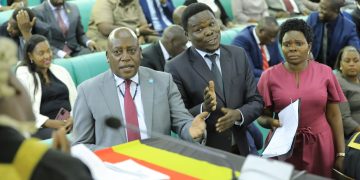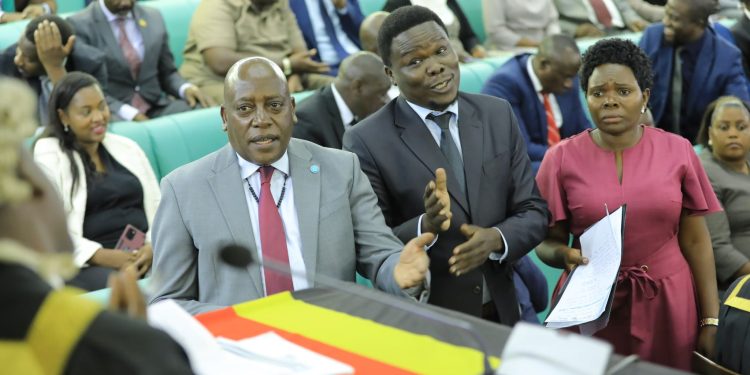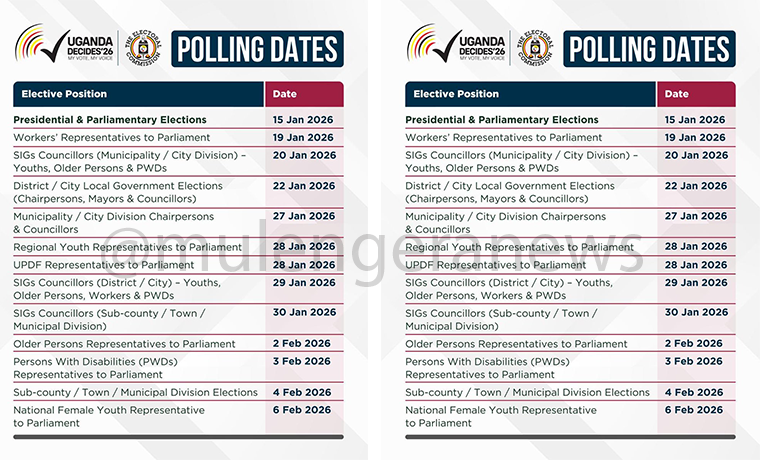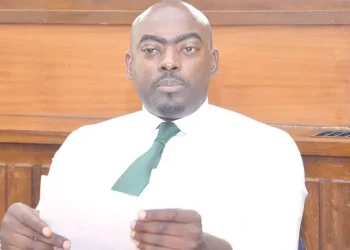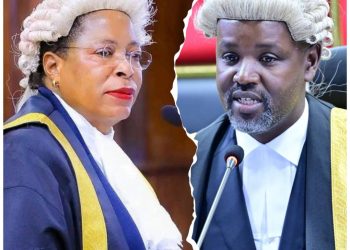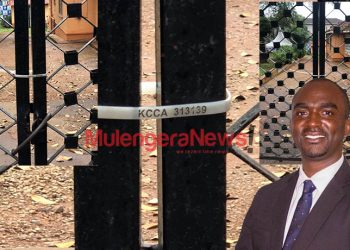By Mulengera Reporters
As the National Resistance Movement (NRM) parliamentary caucus prepares to discuss and endorse proposed amendments to the Uganda Peoples’ Defense Forces (UPDF) Act, the opposition has warned that the rushed process could have serious consequences.
Wilfred Niwagaba, the Shadow Attorney General and Ndorwa East MP, alleges that ruling party MPs are being coerced into passing amendments designed to ensure opposition figures—such as Dr. Kizza Besigye, who has faced treason charges—are tried in the Army General Court Martial.
“If you look at the speed at which they are moving, it’s clear they want to amend the Act while deliberately delaying the transfer of Besigye and other political prisoners to civilian courts. This exposes their sinister motives. They just want to reinstate the defunct Court Martial. Their goal is to find a way to overturn the Supreme Court ruling,” Niwagaba said.
President Yoweri Museveni, the NRM’s national chairman, is set to meet with ruling party legislators to finalize the proposed changes. Recently, the caucus directed Attorney General Kiryowa Kiwanuka to work with Defense Minister Jacob Oboth-Oboth to withdraw the UPDF Amendment Bill, 2024, which is already before Parliament. The aim is to incorporate provisions reforming the Army General Court Martial, as ordered by the Supreme Court in its January 31 ruling, which barred military courts from trying civilians and capital offense cases.
While the Bill has yet to be officially withdrawn, the process is expected to be swift, as such actions do not always require inclusion in the Order Paper. Last week, Speaker Anita Among invoked her powers under the Rules of Procedure to modify the Order Paper, allowing State Minister for Internal Affairs, Gen. David Muhoozi, to withdraw the Forensic Evidence Bill, 2024.
Supreme Court Directives
Government Chief Whip Hamson Obua announced the NRM caucus meeting, stating that members would review detailed proposals from the Attorney General’s chambers.
“This meeting will allow the NRM parliamentary caucus to examine and enrich the proposals that will form part of the UPDF Act amendments,” Obua said.
Though he declined to disclose the specifics, opposition MPs fear the government intends to abandon the original amendments in favor of changes that will address gaps highlighted by the Supreme Court ruling.
Niwagaba assured Ugandans that despite the opposition’s numerical disadvantage in Parliament, they will fight to ensure every clause in the Bill is constitutionally sound. However, he suspects the Executive may bypass standard procedures, fast-tracking the Bill’s approval by moving it straight from the first reading to the Committee of the Whole House without thorough scrutiny.
“They will try to pass it in under 15 minutes without proper debate. But we will not allow that. We will ensure every clause complies with constitutional requirements. If not, we will put up a spirited fight, and the public will be the judge,” Niwagaba warned.
He further cautioned NRM legislators against supporting laws that could later be used against them, citing the cases of former Prime Minister Amama Mbabazi—who was affected by the Public Order Management Act that he once championed—and former Inspector General of Police Gen. Kale Kayihura, who backed policies restricting bail but later found himself detained at Makindye Military Barracks.
“I warn NRM MPs that by enacting laws targeting specific individuals, they may end up being the first victims. We’ve already seen some of them arrested and re-arrested after being granted bail. Today, they think this law is meant for Besigye and opposition activists, but tomorrow, it could be them,” Niwagaba added.
Original Proposals
Before its planned withdrawal, the UPDF Amendment Bill, 2024, proposed several key changes:
Replacing the Field Court Martial with a Unit Disciplinary Committee under Section 193 of the UPDF Act.
Establishing Service Court Martials for each branch of the UPDF, with members appointed by the Commander-in-Chief instead of the High Command. These courts would operate below the General Court Martial, which would serve as an appellate body.
Amending Section 233(2) to allow individuals dissatisfied with General Court Martial decisions to seek redress in the civilian Court of Appeal.
Formalizing the Special Forces Command (SFC)—the elite unit responsible for protecting the President—as an official UPDF service under Section 3 of the Act.
Adding State Ministers of Defense and the Permanent Secretary in the Ministry of Defense to the High Command, the body responsible for key military decisions.
Creating a Joint Military Command, chaired by the Chief of Defense Forces (CDF), to oversee military operations. This body would include the Deputy CDF, service commanders, and other senior officers tasked with advising the CDF, approving war plans, and managing military operations.
Expanding the Deputy CDF’s responsibilities by adding the role of Inspector General of Defense Forces.
Amending Section 53 to grant the Commander-in-Chief powers to re-engage retired officers or soldiers with specialized skills under contract. Currently, retired personnel enjoy civilian status and can participate in partisan politics without any provisions for re-engagement.
With the NRM caucus set to deliberate on the amendments, opposition MPs remain on high alert, prepared for what they anticipate will be a contentious battle in Parliament-Parliament Watch. (For comments on this story, get back to us on 0705579994 [WhatsApp line], 0779411734 & 041 4674611 or email us at mulengeranews@gmail.com).
